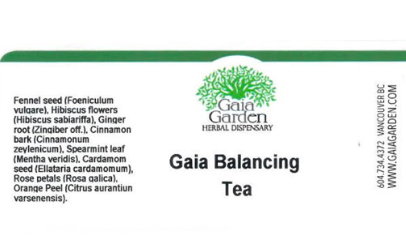Gaia Garden Herbals Inc. of Vancouver, Canada, is recalling Gaia Garden Herbal Dispensary brand “Gaia Balancing Tea” from the marketplace because of the risk of Salmonella contamination, according to a July 23 recall notice posted on The Canadian Food Inspection Agency (CFIA) website..
According to the recall notice, the recalled Gaia Balancing Tea was sold in various sizes, and has no product code or UPC number on the product packaging. The recalled product was sold and distributed in British Columbia from June 12 through July 22, so there is concern consumers may still have the recalled product on hand.
Consumers should not consume the recalled product described below:
| Brand Name | Common Name | Size | UPC | Code(s) on Product |
|---|---|---|---|---|
| Gaia Garden Herbal Dispensary | Gaia Balancing Tea | Variable weight | None | None – Sold from June 12, 2019 to July 22, 2019, inclusive |
“Consumers who are unsure if they have purchased the affected product are advised to contact their retailer,” the recall notice said, “If you think you became sick from consuming a recalled product, call your doctor.”
Consumers are urged to see if they have any of the recalled products in their home. Recalled products should be thrown out or returned to the store where they were purchased.
“This recall was triggered by a recall in another country,” the recall notice said. The CFIA is conducting a food safety investigation, which may lead to the recall of other products; “If other high-risk products are recalled, the CFIA will notify the public through updated Food Recall Warnings.”
Consumers with questions can contact Gaia Garden Herbals Inc at 604-734-4372.
About Salmonella infections
Anyone who has consumed any of the implicated herbal tea and developed symptoms of Salmonella infection should seek medical attention and tell their doctors about their possible exposure.
Symptoms usually include fever, diarrhea that is often bloody, nausea, vomiting, and abdominal pain. Infections from Salmonella bacteria can become very serious, and are sometimes fatal.
Those at highest risk of serious infection include young children, frail or elderly people, and others with weakened immune systems such as cancer patients or transplant recipients. In rare circumstances, infection from Salmonella can result in the organism getting into the bloodstream and producing more severe illnesses such as arterial infections, endocarditis, and arthritis.
(To sign up for a free subscription to Food Safety News, click here.)

